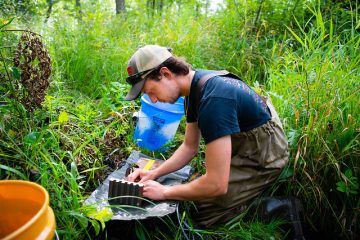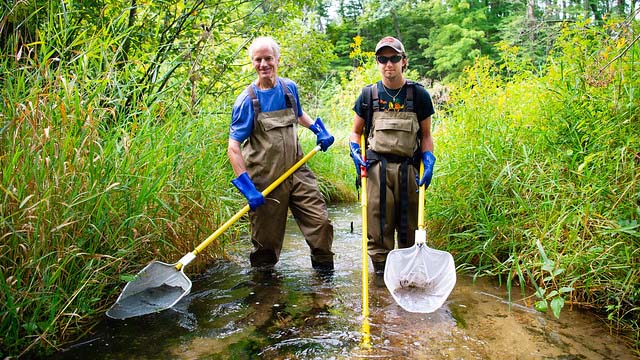University of Wisconsin Oshkosh graduate student Nathan Nozzi spent a chunk of his summer at Emmons Creek in Portage County, studying the effects of climate variation on trout and other fish species.
Yet Nozzi, a student who hails from Winnebago, Illinois and is working on a master’s degree in biology, has never cast a fly rod.
“My family has as cabin in Minoqua,” he said. “I’ve been fishing for years with my dad and grandpa on a lake, but I’ve never been trout fishing.”
The local chapter of Trout Unlimited is paying half of Nozzi’s graduate school tuition through its Trout Unlimited Cares program.
Nozzi is doing research at Emmons Creek as well as Bear Creek near Amherst—both cold water trout streams. He said cold water species have a smaller thermal (temperature) range they can live in.
Both streams originate from lakes and the water in each stream becomes colder downstream as groundwater mixes with lake water. Nozzi is studying the differences in the species of fishes within each stream that are correlated to temperature differences.
Training researchers
Nozzi is working with biology professor Robert Stelzer as part of a UW Oshkosh Student/Faculty Collaborative Research Program.
 “Students gain valuable experience conducting research with faculty at UW Oshkosh because faculty work side-by-side for multiple weeks with students in these collaborative arrangements,” Stelzer said. “Students learn from more experienced researchers in this mentoring model and they also learn how to advance understanding of systems and generate new knowledge that often is beneficial to society. In many fields these contributions from students cannot be fully realized in a classroom setting alone.”
“Students gain valuable experience conducting research with faculty at UW Oshkosh because faculty work side-by-side for multiple weeks with students in these collaborative arrangements,” Stelzer said. “Students learn from more experienced researchers in this mentoring model and they also learn how to advance understanding of systems and generate new knowledge that often is beneficial to society. In many fields these contributions from students cannot be fully realized in a classroom setting alone.”
Stelzer said fish species tend to differ in their sensitivity to warm water temperatures.
Nozzi’s research results, he said, will have implications for cold water stream ecosystems that are very likely to become warmer in the future due to rising air temperatures associated with global climate change.
For a while now, Nozzi—an only child who is a first-generation college student—knew he wanted a career as a fisheries biologist. He expects to graduate in May 2020, and he hopes to get a job that allows him to work a lot of time in the field.
“My ideal job would be a biologist with the U.S. Fish and Wildlife Service,” he said.
Learn more:

